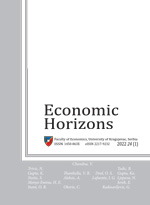ACCOUNTING IMPLICATIONS OF FOREIGN CURRENCY TRANSACTIONS TRANSLATION AND HEDGING
Jasmina Bogicevic
Faculty of Economics, University of Kragujevac, Kragujevac, Serbia
Due to the internationalization of business and frequent fluctuations in exchange rates, information about the impact of changes in exchange rates on individual companies’ and multinational groups’ financial position and profitability has become increasingly important. Data on the translation effects of both foreign currency transactions and foreign subsidiaries’ financial statements, a company’s exposure to different types of foreign exchange risks and taken currency hedging measures enable many users of accounting contents to obtain a better picture of an entity’s financial position and its profitability. The key issues relate to the choice of the exchange rate to be used in accounting data translation and the financial reporting presentation of translation effects. While the effects of the foreign subsidiaries’ financial statements translation can be shown in the balance sheet and the income statement, the effects of foreign currency transactions translation are incorporated in the income statement. This paper discusses the accounting aspects of the foreign currency transactions translation, an enterprise’s transactional exposure to a currency risk, and the use of financial derivative instruments to hedge against foreign exchange risk.
Keywords: foreign currency transaction, transaction exposure, foreign currency financial statements,
currency hedging
JEL Classification: M41, F3




